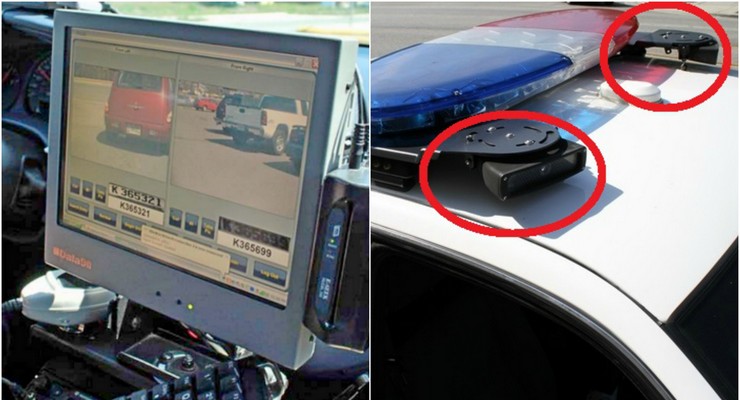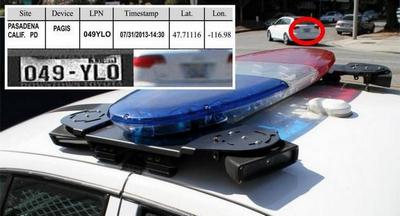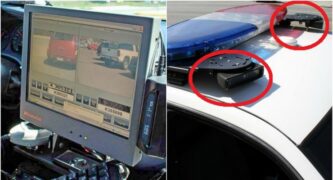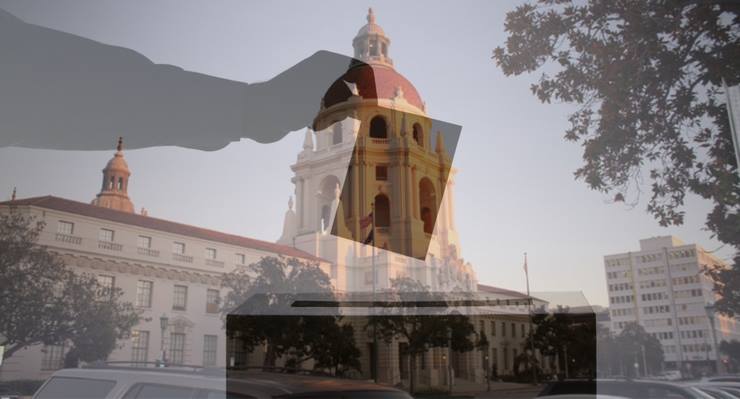
You’re driving in Pasadena, on the way to work, heading home, or to the store or to visit a friend. A Pasadena Police Department Ford Explorer passes. You give it little thought.
In that instant the SUV passes you, its Automated License Plate Reader (ALPR) system photographs your license plate, reads it and matches it with your vehicle’s registration data — the legal ownership of the car, its registration status — then stamps the record with the location where it was photographed and direction of travel, along with the exact time the information was gathered.
It’s probably not the first time a Pasadena police vehicle has passed by you in traffic. Each time, if the police vehicle is equipped with an ALPR, information about your car is collected and saved into a data bank managed by the police department. Enough captures, and your patterns of travel might emerge, were anyone to look up your license plate history.
The system even watches parked cars it passes.

For police, the system is a boon. If the ALPR reader “sees” a stolen car or a vehicle connected with a crime or suspect, it instantly announces the car’s presence and identifies the car to the officers in the police vehicle.
The system works. Over the years, although not all their vehicles carry the system, Pasadena police have repeatedly recovered stolen cars and arrested numerous suspects because of their ALPR system.
But the increasing national popularity of such license plate readers has raised the ire of many civil libertarians, including one local former ACLU president. Many rights activists want to know why the information is collected and saved, and what becomes of the information once it is obtained.
They demand to know, in essence, if a body of evidence is pooled against citizens which might be used against them in the future. Are the police collecting evidence against you even if you have committed no crime? And who gets access — can federal agents use the data, too?
Pasadena civil liberties activist Ed Washatka last week submitted to the Pasadena Police Department a request for public records showing the results of one year’s surveillance on his personal automobile via the Pasadena Police Department’s license plate readers.
Through his attorney, Dale Gronemeier, Washatka formally requested “the results of the Pasadena Police Department’s license plate reader system observations of Ed Washatka’s personal vehicle” from October 1, 2016, to September 30, 2017.
Washatka said he made his California Public Records Act request “to obtain a sample of how extensive this Pasadena Police Department surveillance technology monitors ordinary citizens.”

The use of the technology jumped out to him, Washatka said last week, when he went on a Pasadena police “ride-along” and saw how the camera system “randomly and massively conducts surveillance on local autos. We need information on the levels of police surveillance to have a meaningful debate over the extent of police surveillance.”
Laurie Levenson, professor of law at Loyola Law School, said that “using license plate scanners does not violate the 4th amendment and they’ve been around for a long time, many departments use them.”
As Levenson explained, “The 4th amendment doesn’t protect people against things that everyone can see in public. Your license plate, anybody who’s going down the street, can see it. So if they can see it, so can the police. Therefore, you don’t have a reasonable expectation of privacy, and it’s not a 4th amendment violation.
“The real question,” Levenson continued, “is not whether or not it’s permissible under the 4th amendment to see this information,” said Loyola Law professor Laurie Levenson. “The question is what they’re going to do with it. Ordinarily, we expect law enforcement to be protecting us against crimes, and then trying to solve crimes. We worry if the government just starts collecting a lot of information on everybody and what they’ll be using it for and that’s a separate issue. That can be addressed by legislators or people who run the department, saying how they’re going to use the information. So even if the 4th amendment allows them to collect it, I’m not sure it’s a great idea for them to do so, or be able to use it for any purpose.”
Levenson added, “What I think is a legitimate concern is how much information you want your government to have about where you are at all times and where you’re driving and what you’re doing.”
Explaining his concerns further, Washatka said, “One of the things I’d like to find out of course is why it’s being recorded randomly, not that I know what they’ve got, we don’t know what they’ve got. I have no idea what they’ve got. In the thinking that one day, I’m going to commit a crime, they’ll search this massive vault of data, and it’ll associate me with a crime, and then it’s going to be up to me to prove my innocence.
According to official Pasadena Police policy and procedures, “The Pasadena Police Department is to utilize Automated License Plate Reader (ALPR) technology to capture and store digital license plate data and images while recognizing the established privacy rights of the public. All data and images gathered by the ALPR are for the official use of this department. ALPR allows for the automated detection of license plates. It is used by the Pasadena Police Department to convert data associated with vehicle license plates for official law enforcement purposes, including identifying stolen or wanted vehicles, stolen license plates and missing persons. It may also be used to gather information related to active warrants, electronic surveillance homeland security, suspect interdiction and stolen property recovery.”
The policy also states that “Because such data may contain confidential information, it is not open to public review.”
That policy now may be in question, however, after the California Supreme Court ruled in late August that data collected from Automatic License Plate Readers (ALPRs) are not necessarily “investigative records” that law enforcement can keep secret.
The Court ruled that law enforcement agencies cannot keep secret all the license plate data gathered indiscriminately from millions of unwitting drivers.
The ruling affects Pasadena residents and workers because the Pasadena Police department has mounted Automatic License Plate Readers on a number of its patrol cars and routinely collects, and then saves, an estimated thousands of records daily on city streets. Those records show the locations of vehicles in Pasadena and the times at which they were photographed at that location. When turned on, the ALPRs capture the license plates of virtually every car in the vicinity of the police cruiser, whether parked or moving.
The ruling stemmed from a case filed by the American Civil Liberties Union (ACLU) and the Electronic Frontier Foundation (EFF) against the Los Angeles Sheriff Department in early 2014. The ACLU earlier sought information on how the law enforcement agencies are using ALPRs to gather information about car owners. The two watchdog nonprofits argued in court that two named departments are illegally keeping quiet on how the information is used.
The official policy further explains, “The Strategic Services Division Commander shall be responsible for a description of how the ALPR system will be monitored to ensure the security of the information and compliance with applicable privacy laws,” along with “working with the City’s Department of Information Technology and the Custodian of Records on the retention and destruction of ALPR data.”
The department is also specific regarding the use of the system, stating, “Department members shall not use, or allow others to use the equipment or database records for any unauthorized purpose.
“An ALPR shall only be used for official law enforcement business,” the policy continues, and says, “An ALPR may be used in conjunction with any routine patrol operation or criminal investigation. Reasonable suspicion or probable cause is not required before using an ALPR.” The department’s official policy also states that “ALPR data may be shared only with other law enforcement or prosecutorial agencies for official law enforcement purposes or as otherwise permitted by law, by emailing the internal pd_cau group. Requests must be made utilizing a government recognized email account.”
In addition, the policy states that, “While an ALPR may be used to canvass license plates around any crime scene, particular consideration should be given to using ALPR-equipped cars to canvass areas around homicides, shootings and other major incidents. Partial license plates reported during major crimes should be entered into the ALPR system in an attempt to identify suspect vehicles.”
According to department policy, “Data will be transferred from vehicles to the designated storage in accordance with department procedures. All ALPR data downloaded to the server should be stored for a minimum of two years in accordance with the City’s established records retention schedule. Thereafter, ALPR data will be purged.”
Nonetheless, as Washatka explained, “Here I am, an average citizen, on the streets of Pasadena, and my license plate is being recorded and the date, time and place, and it’s stored somewhere, and to what purpose? So really, what I want to find out is, what kind of information they have on me.”
Continued Washatka, “(This information) is none of their business. It’s none of their business where I go. This is America, this is not a police state, this is not, you know, 1960 Russia or Romania, or East Berlin. I have the right to go wherever I want. I don’t need the police to be tracking me, taking pictures of my license plates and who knows what they’re going to do with it. I’m not a suspect, I’ve committed no crime, my license plate is up to date. There’s no reason for them to take pictures of my license plate.”
Washatka, meanwhile, stressed that his public records act request was not an ACLU request, but a personal one.
“I don’t want to jump the gun here,” he said, “I’m not presuming that they’re guilty, I’m not presuming that they are using this in any fashion either but I don’t know that, so I want to know. So, just as I’m demanding the presumption of innocence, I’m willing to concede that they’re not using this this data for nefarious purposes. But I need to know that, so this is just a start of a conversation to see what’s going on with that data.”
“In this country,” Washatka emphasized, “you’re already presumed innocent. I don’t have to prove my innocence, you have to prove my guilt. So this sweeping, driving up and down the streets of Pasadena randomly collecting license plate data, in the thinking is that one day, they’ll have it, when I finally commit my crime, that’s nonsense. There’s no control in that information, they’re gathering up information and there’s no control of what they can do with it.
Attorney Gronemeier detailed their concerns.
“One of the issues with the license plate reader information is they are randomly collecting massive amounts of data. After a ride-along with the police, Mr. Washatka’s conclusion was that they’re just sweeping up an enormous amount of data that is not based upon any suspicion,” Gronemeier said. “Cop cars will drive down the street and they’ll record all of the license plate numbers.”
“That doesn’t mean anybody was under suspicion,” Gronemeier continued. “They gather it and put it in the data bank. So, that’s part of what led to our desire to get some idea of how systematic and how random the surveillance is. It appears that this is, at the least, very wide surveillance activity.”
Automatic number-plate recognition (ANPR), which is in most larger Pasadena Police Department vehicles, is a algorithmic technology that uses optical character recognition to read vehicle license patterns. The system, which is used around the world, can use existing closed-circuit television, or cameras specifically designed for the task.
According to the International Association of Chiefs of Police website, “Law enforcement agencies throughout the nation and around the world are increasingly adopting Automated License Plate Recognition (ALPR) systems to enhance their enforcement and investigative capabilities, expand their collection of relevant data, and expedite the tedious and time consuming process of comparing vehicle license plates with lists of stolen, wanted, and other vehicles of interest.”
“What’s happening,” said Gronemeier, “is that technology is providing the police with more and more surveillance tools. They are adapting that technology, the scale and the intrusiveness of surveillance into citizen privacy is expanding in a geometric progression, and inevitably as a result of that, I think there’s growing concern about that, and the beginning of a dialogue because we want reasonable law enforcement, but we do not want a surveillance state in this nation.”
Washatka also credited the police, saying, “I am critical of some things, but I want to say this, I also appreciate the hard work and the difficult work they have to perform these days and so they’re taking steps, using the tools available to protect us, but there’s a flipside to that, there’s sort of a doppelganger, there’s the good side and the bad side.”














 0 comments
0 comments


